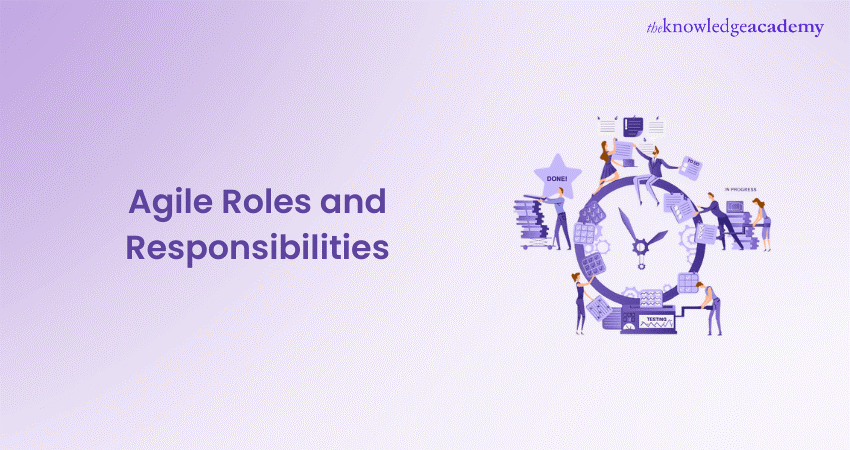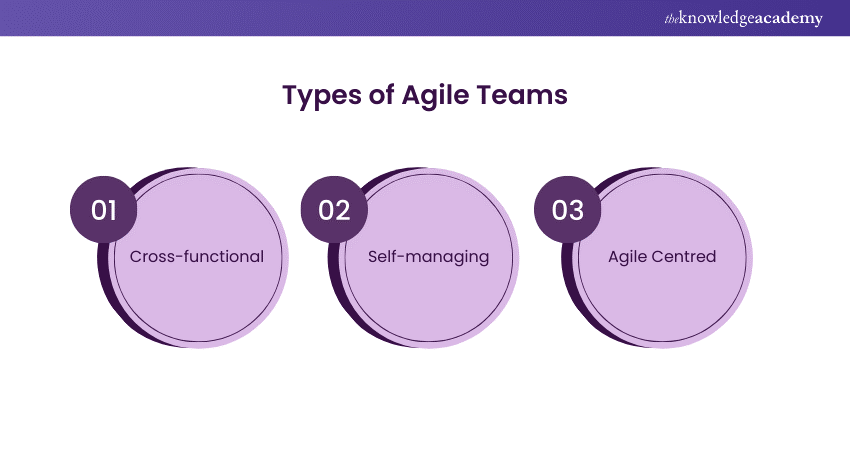We may not have the course you’re looking for. If you enquire or give us a call on +40 316317743 and speak to our training experts, we may still be able to help with your training requirements.
Training Outcomes Within Your Budget!
We ensure quality, budget-alignment, and timely delivery by our expert instructors.

Navigating the world of Agile can seem daunting, especially when trying to understand Agile Roles and Responsibilities. Whether you're new to Agile or looking to refine your processes, this blog is here to help.
This blog will walk you through the key roles in an Agile framework, the various types of Agile teams, and how to effectively build Agile roles within your organisation. By the end of this blog, you'll have a clear understanding of how to implement Agile methodologies successfully.
Table of Contents
1) Agile Job Roles
a) Product Owner
b) Team Lead/Scrum Master
c) Development Team Members
d) Stakeholders
e) Product Designer
f) Writer
g) Programmer
h) Tester
i) UX Specialist
j) Architects
k) Independent Testers and Auditors
l) Technical and Domain Experts
2) Types of Agile Teams
3) How to Build Agile Team Roles in Your Organisation?
4) Conclusion
Agile Job Roles and Their Responsibilities
In an Agile framework, various roles contribute to the success of the project. Each role has distinct responsibilities that ensure the team functions smoothly and efficiently. Let’s explore each role in detail and get a jest of their responsibilities.
Product Owner
The Product Owner defines the product features and ensures that the team delivers value. They manage the product backlog and prioritise tasks based on business needs.
Responsibilities:
1) Define and prioritise the product backlog.
2) Communicate the product vision to the team.
3) Ensure the team understands the product goals and requirements.
Team Lead/Scrum Master
The Scrum Master facilitates the Agile process, making sure the team follows Agile principles and practices. They help remove obstacles and support the team in achieving its goals.
Responsibilities:
1) Facilitate daily stand-ups and other Agile ceremonies.
2) Remove impediments that hinder the team's progress.
3) Foster a culture of continuous improvement.
Development Team Members
Development team members create the product. They are cross-functional and collaborate to design, develop, and test the product.
Responsibilities:
1) Develop and implement product features.
2) Collaborate on design and technical solutions.
3) Conduct code reviews and ensure quality standards.
Stakeholders
Stakeholders are individuals or groups that invest their interest in the project. They provide feedback and requirements, ensuring the product meets business objectives.
Responsibilities:
1) Provide input and feedback on product features.
2) Review and approve product increments.
3) Ensure alignment with business goals.
Unlock your potential and drive your career forward with our SAFe Agile Certification!
Product Designer
Product Designers focus on User Experience and interface design. They ensure the product is user-friendly and visually appealing.
Responsibilities:
1) Create wireframes and prototypes.
2) Conduct user research and usability testing.
3) Collaborate with developers to implement design solutions.
Writer
Writers create and maintain documentation, user guides, and other content necessary for the product. They ensure the clarity and usability of all written materials.
Responsibilities:
1) Develop user manuals and guides.
2) Maintain product documentation.
3) Ensure consistency and clarity in all written content.
Programmer
Programmers write the code that powers the product. They work closely with other team members to implement features and fix bugs.
Responsibilities:
1) Write clean, maintainable code.
2) Debug and fix issues in the codebase.
3) Collaborate with other developers on technical solutions.
Understand Agile principles for adaptable and responsive project management with our Agile Project Management Foundation & Practitioner (AgilePM®) Training – register today!
Tester
Testers are responsible for quality assurance. They identify and report bugs, conduct various tests, and ensure the product meets required standards before release.
Responsibilities:
1) Design and execute test cases.
2) Report and track bugs.
3) Validate fixes and ensure product quality.
UX Specialist
A UX Specialist ensures the product provides a positive User Experience. They conduct user research and create wireframes to enhance usability.
Responsibilities:
1) Conduct user research and interviews.
2) Create user personas and journey maps.
3) Design wireframes and prototypes for user testing.
Architects
Architects design the overall system architecture. They ensure the product's technical foundation is solid, scalable, and aligned with business goals.
Responsibilities:
1) Define the technical architecture and framework.
2) Ensure scalability and performance of the system.
3) Review and approve design and technical decisions.
Independent Testers and Auditors
Independent Testers and Auditors provide an unbiased review of the product. They ensure compliance with standards and conduct external testing and audits.
Responsibilities:
1) Conduct independent testing and verification.
2) Ensure compliance with industry standards.
3) Provide audit reports and recommendations.
Technical and Domain Experts
Independent Testers and Auditors provide an unbiased review of the product. They ensure compliance with standards and conduct external testing and audits.
Responsibilities:
1) Conduct independent testing and verification.
2) Ensure compliance with industry standards.
3) Provide audit reports and recommendations.
Learn how to become an efficient Project Manager with our Certified Professional in Agile Project Management (CPAPM) Course – sign up now!
Types of Agile Teams
Agile teams can be structured in a few different ways to maximise efficiency and effectiveness. Here are the primary types of Agile teams you might encounter.

Cross-functional
Cross-functional teams include members with different skill sets working together to complete tasks. This diversity allows for comprehensive problem-solving and faster delivery.
Self-managing
Self-managing teams have autonomy. This means they can make decisions and manage their own work. This empowerment fosters accountability and often leads to higher motivation and productivity.
Agile-centred
Agile-centred teams fully embrace Agile principles and practices. They continuously iterate, improve, and adapt to changing requirements and feedback.
How to Build Agile Team Roles in Your Organisation?
Building effective Agile teams requires careful planning and consideration. Start by identifying the necessary Agile Roles and Responsibilities based on your project needs. Ensure you encourage collaboration and communication within the team and provide training on Agile methodologies. Foster a healthy culture of continuous improvement and adaptability to ensure long-term success.
Conclusion
Understanding Agile Roles and Responsibilities is essential for implementing Agile methodologies effectively. This blog clearly defined each Agile Roles and Responsibilities effectively. It will help you in fostering a collaborative environment for your organisation to achieve greater efficiency, innovation, and success in its Agile projects.
Enhance your collaboration skills with our Agile Training – join now!
Frequently Asked Questions

The role matrix in Agile defines the responsibilities and interactions between different roles within the team, ensuring clarity and accountability.

Yes, RACI (Responsible, Accountable, Consulted, Informed) can be used in Agile to define roles and responsibilities, although Agile frameworks often emphasise more flexible and collaborative approaches.

Yes, RACI (Responsible, Accountable, Consulted, Informed) can be used in Agile to define roles and responsibilities, although Agile frameworks often emphasise more flexible and collaborative approaches.

The Knowledge Academy takes global learning to new heights, offering over 30,000 online courses across 490+ locations in 220 countries. This expansive reach ensures accessibility and convenience for learners worldwide.
Alongside our diverse Online Course Catalogue, encompassing 17 major categories, we go the extra mile by providing a plethora of free educational Online Resources like News updates, Blogs, videos, webinars, and interview questions. Tailoring learning experiences further, professionals can maximise value with customisable Course Bundles of TKA.

The Knowledge Academy’s Knowledge Pass, a prepaid voucher, adds another layer of flexibility, allowing course bookings over a 12-month period. Join us on a journey where education knows no bounds.

The Knowledge Academy offers various Project Management Courses, including the Earned Value Management Foundation and Practitioner Course, and the Scrum Certification. These courses cater to different skill levels, providing comprehensive insights into Types of Agile Methodology.
Our Project Management Blogs cover a range of topics related to Agile Management, offering valuable resources, best practices, and industry insights. Whether you are a beginner or looking to advance your Agile Management skills, The Knowledge Academy's diverse courses and informative blogs have got you covered.
Upcoming Project Management Resources Batches & Dates
Date
 Agile Project Management Foundation & Practitioner (AgilePM®)
Agile Project Management Foundation & Practitioner (AgilePM®)
Mon 6th Jan 2025
Mon 13th Jan 2025
Sat 18th Jan 2025, Sun 19th Jan 2025
Mon 20th Jan 2025
Mon 27th Jan 2025
Mon 3rd Feb 2025
Mon 10th Feb 2025
Mon 17th Feb 2025
Mon 24th Feb 2025
Mon 3rd Mar 2025
Mon 10th Mar 2025
Mon 17th Mar 2025
Sat 22nd Mar 2025, Sun 23rd Mar 2025
Mon 24th Mar 2025
Mon 31st Mar 2025
Mon 7th Apr 2025
Mon 14th Apr 2025
Tue 22nd Apr 2025
Mon 28th Apr 2025
Tue 6th May 2025
Mon 12th May 2025
Sat 17th May 2025, Sun 18th May 2025
Mon 19th May 2025
Tue 27th May 2025
Mon 2nd Jun 2025
Mon 9th Jun 2025
Mon 16th Jun 2025
Mon 23rd Jun 2025
Mon 30th Jun 2025
Mon 7th Jul 2025
Mon 14th Jul 2025
Sat 19th Jul 2025, Sun 20th Jul 2025
Mon 21st Jul 2025
Mon 28th Jul 2025
Mon 4th Aug 2025
Mon 11th Aug 2025
Mon 18th Aug 2025
Mon 25th Aug 2025
Mon 1st Sep 2025
Mon 8th Sep 2025
Mon 15th Sep 2025
Sat 20th Sep 2025, Sun 21st Sep 2025
Mon 22nd Sep 2025
Mon 29th Sep 2025
Mon 6th Oct 2025
Mon 13th Oct 2025
Mon 20th Oct 2025
Mon 27th Oct 2025
Mon 3rd Nov 2025
Mon 10th Nov 2025
Sat 15th Nov 2025, Sun 16th Nov 2025
Mon 17th Nov 2025
Mon 24th Nov 2025
Mon 1st Dec 2025
Mon 8th Dec 2025
Mon 15th Dec 2025







 Top Rated Course
Top Rated Course



 If you wish to make any changes to your course, please
If you wish to make any changes to your course, please


